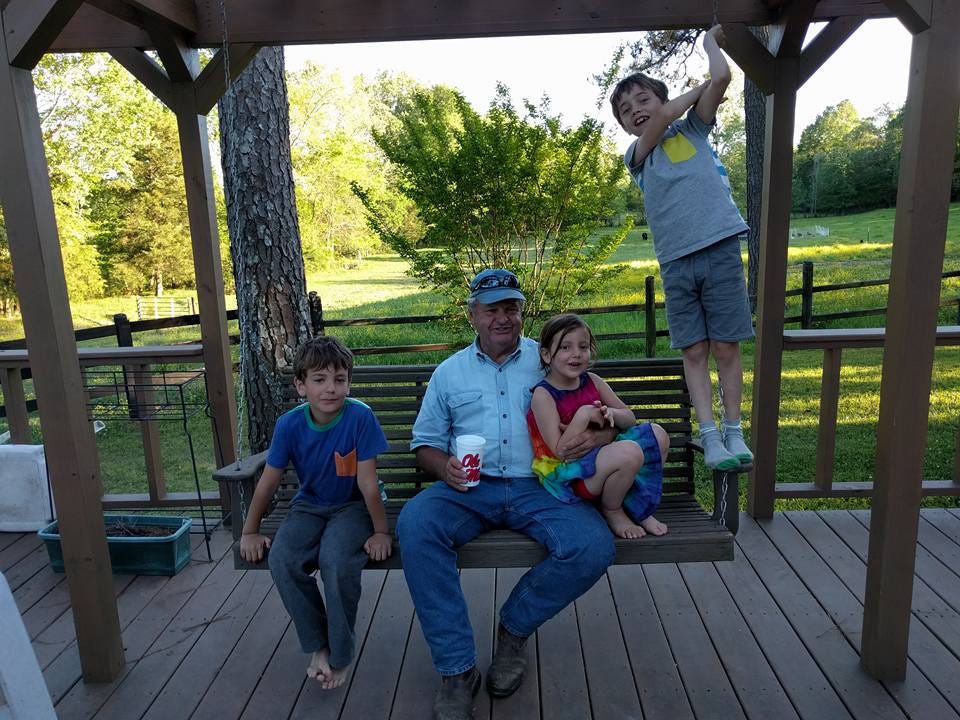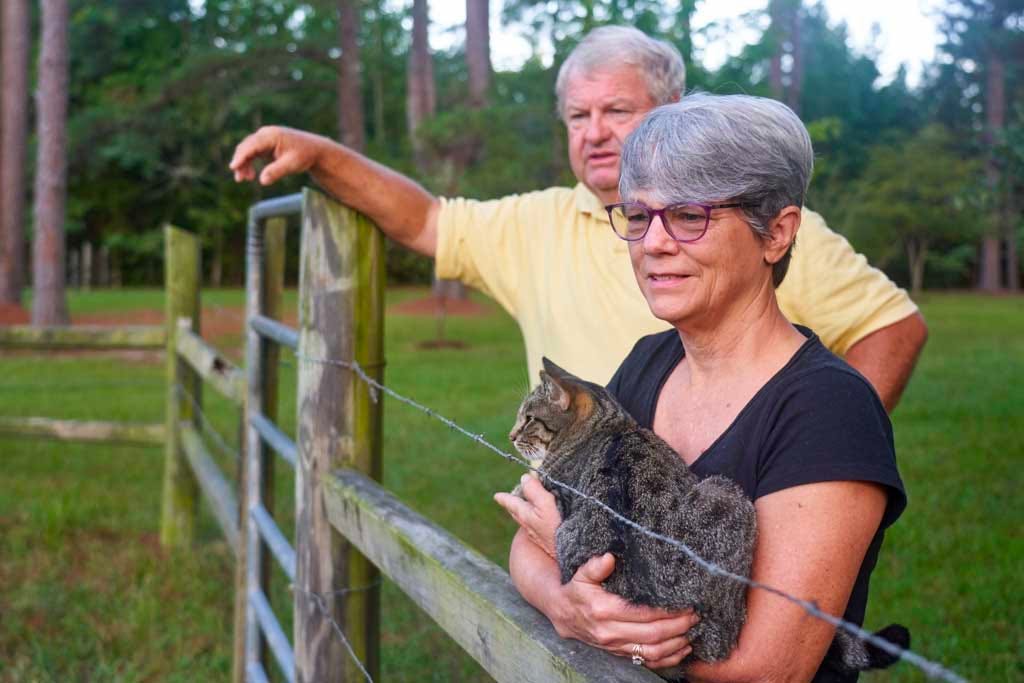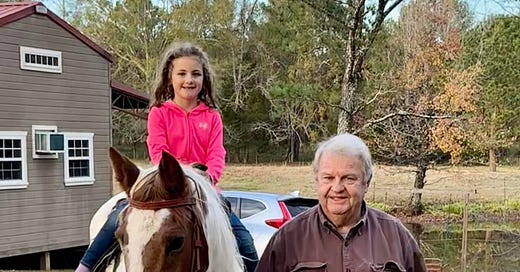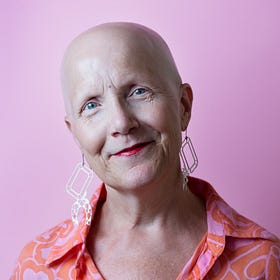Mississippi Native: Johnny Wray
"Whether it’s walking the pastures and woods of our farm, taking a drive down the Natchez Trace, or visiting my maternal kinfolks in rural Choctaw County, I feel rooted and grounded in this place."
What does it mean to call Mississippi home? Why do people choose to leave or live in this weird, wonderful, and sometimes infuriating place? After many years away, Johnny Wray moved back to Mississippi to fulfill his dream of living and working on a small, regenerative farm. He and his wife now run High Hope Farm near West Point, where they raise grass-fed beef and lamb and share hospitality to a steady stream of guests at the farm’s Grateful Guest House. Johnny writes: “We are striving to make our farm itself a community of hospitality—what we like to call ‘a harmony of goodness’—from the network of microbes in the soil to the animals that graze our fields to the many and varied guests who make their way here.” Today Johnny shares how his home state’s many contradictions have kept him rooted here.
Where are you from?
I was born and raised in West Point.
Why did you leave Mississippi? Where did you go?
After graduating from Millsaps College, I moved to a small Kentucky village, Waddy, KY, to attend graduate seminary at Lexington Theological Seminary, Lexington, KY.
Why did you return to Mississippi?
For several reasons, I suppose, but all related. My mom was aging and we wanted to be closer to her. Deb and I both wanted to simplify our lives. I’d been traveling extensively both domestically and internationally and was ready for a more settled life. I was eager while still fairly young to fulfill a lifelong dream of living and working on a small farm.
Mississippi can be a perplexing place. We’re the “hospitality” state, yet there remains a lot of fear and mistrust here of the “other.”
Was the Mississippi you returned to the same one you had left?
In some ways yes and in some ways no. In some ways for the better, in some ways not so much. Mississippi can be a perplexing place. We’re the “hospitality” state, yet there remains a lot of fear and mistrust here of the “other.” We’re a largely agricultural state, yet we export most of what we produce agriculturally and import most of what we eat. Studies have shown we are one, if not the most, generous state in the nation and yet one, if not the most, politically corrupt. We are supposedly a pro-life state, but we have some of the worst mortality rates and health statistics in the country. We’ve got great colleges and universities—Millsaps is a perfect example—and one of the best medical schools in the country, yet our public education system is underfunded, understaffed, and undervalued with the obvious underperforming results. I’ve learned—or chosen—to love Mississippi for her virtues as well as in spite of her vices!
What does “home” mean to you? How does Mississippi fit into that definition?
The Kentucky writer, farmer, and activist Wendell Berry said it best for me: “There is a day when the road neither comes nor goes, and the way is not a way but a place.” Mississippi has been that place for me. Whether it’s walking the pastures and woods of our farm, taking a drive down the Natchez Trace, or visiting my maternal kinfolks in rural Choctaw County, I feel rooted and grounded in this place.
How have you cultivated community in Mississippi? Who are the people who have made you feel rooted here?
By opening our farm and our Grateful Guest House to a host of wayfarers—family, friends, strangers, farm customers, artists, writers, ministers, RV’ers, whoever. We are striving to make our farm itself a community of hospitality—what we like to call “a harmony of goodness”—from the network of microbes in the soil to the animals that graze our fields to the many and varied guests who make their way here. All are valued and welcomed. All have a purpose and a place here.
We are striving to make our farm itself a community of hospitality—what we like to call “a harmony of goodness”—from the network of microbes in the soil to the animals that graze our fields to the many and varied guests who make their way here.
What’s the weirdest question or assumption you’ve encountered about Mississippi (or about you as a Mississippian) by someone who’s never been here?
Oh I’ve gotten the usual, “do you all have indoor plumbing?”… those kind of inane questions, and I used to get defensive about them. Now I just invite people to come spend a day at the Mississippi Arts and Entertainment Experience in Meridian, or spend time visiting the sites along the Mississippi Blues Trail, or take a leisurely drive along the Natchez Trace, or read Grisham, Faulkner, Morris, Ward, Iles, Welty, Walker, Brown, Laymon, Wilkie, Wright, Brown, Stockett, Eubanks…

How has living in Mississippi affected your identity and your life’s path?
I would ask, “how can growing up here and living here not affect your identity and your life’s path.” I’ve witnessed and occasionally still witness racist attitudes and actions here, yet I’ve also seen some of the most endearing and enduring relationships of love and justice between races. I pray the latter has impacted me the most and for the better.
What is something that you’ve learned about Mississippi only by living here? In what ways has Mississippi lived up to your expectations?
This may seem like a little thing but I think Mississippi may have the best public radio system in the entire country. Every corner of the state and all places in between have access to Mississippi Public Broadcasting. But considering our rich literary and our deep and varied cultural history maybe that is not so unexpected.
I’ve witnessed and occasionally still witness racist attitudes and actions here, yet I’ve also seen some of the most endearing and enduring relationships of love and justice between races. I pray the latter has impacted me the most and for the better.
Do you still think about moving away someday? Does a sense of duty keep you rooted here? Do you have a “tipping point”?
I suppose if I were younger I might seriously consider moving elsewhere and can even fantasize about that on occasion—especially in light of the prevailing politics here. But I’ve chosen to live here and that includes a responsibility to the younger and future generations of Mississippians to do what we can, where we can, however we can to make Mississippi a better, more just and thriving society for all its citizens.
What do you wish the rest of the country understood about Mississippi?
That we’re all in this together.

Is there a Mississippi change-maker who you think everyone needs to know about?
There are so many to name but I suppose if it is just one it would have to be Reverend Will D. Campbell, author of the acclaimed Brother to a Dragonfly, and, in my humble opinion, the most significant white person in the Civil Rights Movement. In spite of once having a KKK bounty on his head if he came back to Mississippi, Will never lost his love for his home state. His core theological beliefs—“we’re all bastards, but God loves us anyway,” and “if you love one you’ve got to love them all”—would have an enormous impact on Mississippi if we who claim to be so religious, believed and lived what Will believed and practiced.
The Kentucky writer, farmer, and activist Wendell Berry said it best for me: “There is a day when the road neither comes nor goes, and the way is not a way but a place.” Mississippi has been that place for me.
If you had one billion dollars to invest in Mississippi, how would you spend your money?
I could probably buy a seat in Trump’s cabinet! Well, I can’t imagine having a billion dollars and since many other responders here have already taken care of our educational, health and other systems in need, I would fund and support a local, organic restaurant in ever county in the state that served only Mississippi regeneratively grown fruits, vegetables, fish and meats, along with the local farmers needed to make that happen.
What or who do you want to shamelessly promote? (It can absolutely be a project you’re working on, or something you are involved in.)
The far too few local regenerative farmers who are trying to raise and provide healthy, safe, chemical free, nutrient rich food at a fair and reasonable price for a citizenry that is in much need of an ample, accessible supply. Also, I'd like to give a shout out to a couple of Mississippi organizations that Deb and I believe strongly in: Southern Christian Services for Children and Youth that is making lives better and brighter for some of our most vulnerable children and youth and Working Together Mississippi that is striving to make our state more just and equitable for all our citizens.
After serving seventeen years as the Director of the Week of Compassion, the humanitarian response program of the Christian Church (Disciples of Christ), Johnny Wray and his wife Deb moved to High Hope Farm in Cedar Bluff, MS in 2009 where they regeneratively raise grass-fed beef and lamb and share hospitality to a steady stream of guests at the farm’s Grateful Guest House. Prior to that Johnny grew up in West Point, MS, earned a bachelor degree in political science at Millsaps College, a master of divinity degree in social ethics at Lexington (KY) Theological Seminary, and served Disciples of Christ congregations in Mississippi, Kentucky and Tennessee. In his work with Week of Compassion he traveled extensively domestically and internationally managing his denominations resources for emergency response, refugee assistance and sustainable development efforts.
One year ago:
Mississippi Transplant: Kevin Brown
"The people who have made me feel the most rooted here are actually other transplants. Engaging and understanding each other's story, background and common values often provides a bridge for communication and fellowship."
Two years ago:
Mississippi Transplant: Rachel Dangermond
"There are many reasons I could leave, but just like when Trump was elected and I wanted to move to Canada, a friend said, “No, we stay, we fight, we make it right.”








Your description of Mississippi as a "perplexing" place is spot-on. You're doing such important work here, and I love your idea about how to spend a billion dollars in the state - and your shout-out to MPB!
Beautiful and sharp as per usual, thank you Johnny!